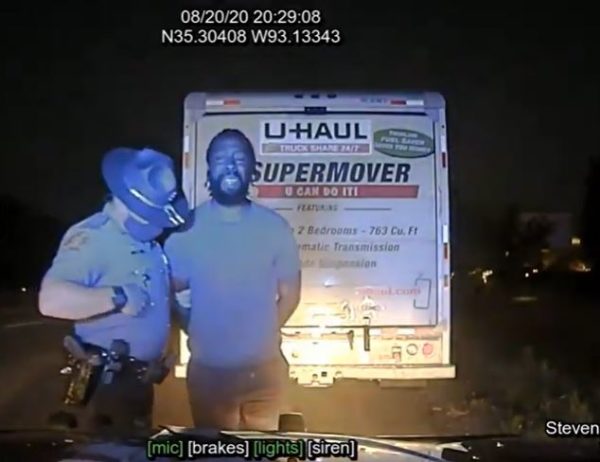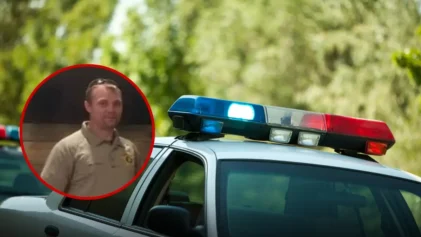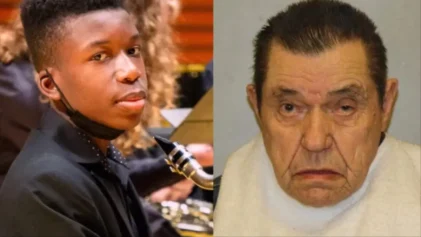Marion Humphrey Jr. has long dreamed of becoming an attorney so he can use law to fight some of the ills of racism he witnessed growing up in Little Rock, Arkansas.
Humphrey, 32, is in the midst of his third year of law school at the University of Arkansas. It’s a lifelong mission steeped in family tradition. Humphrey’s dad spent 18 years as a circuit judge before retiring in 2010. Humphrey hopes to follow in his footsteps.
But last August, the aspiring lawyer claims he was subjected to some of the injustices he plans to avenge one day in the courtroom.
Steven Payton, an Arkansas state trooper, pulled Humphrey over as he was driving home from college. The trooper detained him for more than an hour while he and other officers searched and ransacked Humphrey’s U-Haul truck looking for drugs.
They found none.

In a federal lawsuit, attorneys representing Humphrey argue the trooper had no just cause to even initiate a traffic stop. The lawsuit claims Payton listed nothing suspicious about Humphrey’s actions in an incident report and dashcam video shows he exaggerated parts of his report to warrant his action. But attorneys claim it was simply a case of Humphrey “driving while Black,” alleging that Payton targeted Humphrey simply because of his race.
“We know police stop African-Americans who are driving while black all the time,” said former U.S. Attorney Conner Eldridge, who is representing Humphrey. “This case is not one where someone was shot or killed, thankfully. But that’s what makes it newsworthy to me is that it’s representative of what happens to African-Americans all the time. And often we don’t get to hear about those things.”
A team of attorneys filed suit on Humphrey’s behalf on March 11 in the U.S. Eastern District Court of Arkansas. They are seeking emotional and punitive damages, alleging the trooper violated Humphrey’s civil rights with an unlawful search and seizure.
“Because he was driving a U-Haul on I-40, they have reasonable suspicion to think he’s carrying drugs? Well, give me a break,” Eldridge told Atlanta Black Star. “Once again, we’re back to racist conclusions because you have a Black man driving a U-Haul. What if it was a white woman? Would you make the same assumption? If he would not make the same assumption, that is racist policing. That must stop.”
Arkansas State Police remained tight-lipped about the incident. Eldridge said State Police have yet to file any responses in court. Agency spokesman Bill Sadler issued a brief non-statement to CBS-KFSM 5News last week.
“State police commanders have not seen a copy of the lawsuit and we will not be making public statements about the case while there is pending litigation,” he said.
According to the lawsuit, Humphrey was preparing for his third year of law school at the University of Arkansas. Coursework at the university’s Fayetteville campus shut down last fall due to COVID-19, and Humphrey’s classes were only offered online. He decided to relocate back to his hometown of Little Rock to be closer to family while he took his virtual classes.
Humphrey rented a Ford F-450 15-foot box truck from U-Haul and loaded it with his bed, furniture, clothes, books and other items. He was driving eastbound on Interstate 40 about 90 miles west of Little Rock when he passed Trooper Payton, who was camped out on the highway’s median.
Payton documented the encounter in a memo he submitted to his supervisors four days later. According to that report, the trooper initially said Humphrey’s U-Haul “appeared to be traveling together” with a Cadillac Escalade a few car lengths ahead.
Payton began trailing both vehicles and pulled ahead of the U-Haul. He claimed the driver “appeared extremely nervous,” although Humphrey was sitting too far back in his seat for the trooper to see him. Payton found it fishy that Humphrey kept his attention on the road ahead and never turned to look in his direction. He described Humphrey having a tight grip on the steering wheel with his hands positioned at 10 and 2 and “his arms…locked out straight.”
“These actions by the driver made me suspicious of some kind of criminal activity,” Payton wrote in his memo.
The state trooper finally stopped the U-Haul about 11 miles later in Russellville after he says Humphrey abruptly signaled to exit the interstate then swerved off the exit ramp to stay on the highway. Payton’s report indicated the sudden lane changes “caused the weight of the truck to shift.”
They are allegations Humphrey says in his lawsuit the officer exaggerated. Humphrey’s attorneys deny any erratic driving and contend Payton racially profiled him.
Payton ordered Humphrey out of the truck and badgered him on the side of the highway. He repeatedly asked if there were any guns or drugs in the moving truck. Humphrey said there weren’t.
The man was admittedly shaken during the ordeal, which came less than three months after George Floyd’s death. Humphrey told Payton he was nervous, saying, “I honestly just don’t want to get shot. It happens, and I know it happens.”
He called his father and kept him on speaker phone to listen during the encounter.
Payton claimed Humphrey was acting “super nervous,” and his hands and voice were shaking as he spoke. When Humphrey asked if the trooper had probable cause to stop him, Payton responded “Yeah, you about wrecked your truck back there. That’s why I stopped you.”
During the stop, Payton took issue with Humphrey going to law school and belittled him for calling his father, the lawsuit claims. Dashcam footage showed he derisively quipped, “32 years old and going to school still?” while checking Humphrey’s driver’s license. When the man asked for his cellphone back to speak to his father, Payton got in his face and said “What are you, 16?” Humphrey answered he was 32, and the trooper shot back, “You’re a grown man.”
The trooper pressed Humphrey to give him consent to search the truck asking, “If I bring a dog, is it going to alert to anything?” Humphrey denied he almost lost control of the U-Haul and did not give Payton permission for the search. He later relented and told Payton he could take a look, but the trooper called for a drug-sniffing K-9 from the U.S. Forest Service.
After the search dog circled the U-Haul for about a minute, its handler gave Payton the “thumbs up” sign for an alert for narcotics in the truck. Payton then handcuffed Humphrey and placed him in the back of his squad car.
“He’s arresting me! Daddy, he’s arresting me,” Humphrey shrieked into his phone as Payton placed him in custody.
Humphrey sobbed and screamed to his father from the trooper’s back seat, “I don’t want to die tonight.”
Payton and several officers from other agencies rifled through the U-Haul for more than an hour, ripping open boxes, unzipping suitcases, and tossing Humphrey’s items around the back of the cabin. The officers tried to tear open the seats in the truck’s cabin. Payton at one point suggested drilling open the wall panels and called for an X-ray machine.
Dashcam footage showed him calling Humphrey “obnoxious” and claiming his father might not be his actual father, the lawsuit noted. He continued to demean Humphrey during the search, saying, “I wouldn’t call my daddy at 32.”
After all those efforts, authorities found nothing illegal in Humphrey’s truck. Payton gave him a warning for careless driving and released him from the scene.
Humphrey is expected to graduate from law school later this year. He was unavailable for comment. Eldridge said the incident left him traumatized, but he resolved to fight the case in court.
“I think this has made him more passionate,” the attorney said. “He was well aware and had already done some work in certain sectors. I mean, he’s not surprised by the fact that law enforcement acts like this. Was he traumatized, does he consider it unfortunate that it happened to him? Absolutely. But I don’t think he’s surprised at all.”
In 2013, the American Civil Liberties Union filed suit against Payton, accusing him of using excessive force at his previous job as a deputy marshal in the Arkansas city of Dover. The suit claimed Payton and other officers beat, kicked, searched, arrested and tased a man multiple times during a 2011 incident. Audio and video footage of the encounter “mysteriously” disappeared, ACLU alleged.
“Unfortunately, the Arkansas State Police, they don’t feel like there’s a problem,” Eldridge said. “They think that all this is just fine, and African Americans are not treated any differently. And if they are, there’s good reason. That’s that’s the opinion of the Arkansas State Police. And it’s really unfortunate that they’ve taken that position rather than say, ‘We know that African Americans are treated in a disparate manner, and we want to be a part of the solution.'”


